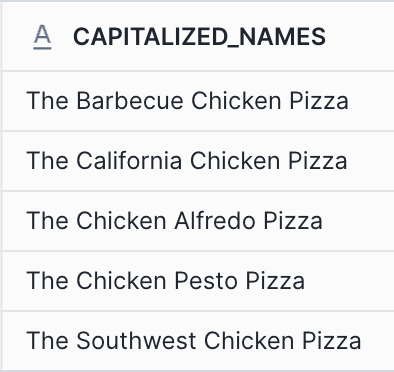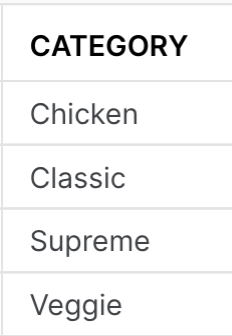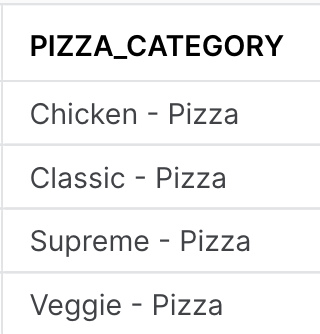Functions, sorting, and grouping
Introduction to Snowflake SQL

George Boorman
Senior Curriculum Manager, DataCamp
String functions - INITCAP
Syntax: INITCAP( <expr> )
- Capitalize each word in a string
SELECT INITCAP(category) AS capitalized_category
FROM pizza_type

String functions - CONCAT
- Combines the expressions
Syntax:
CONCAT( <expr1> [ , <exprN> ... ] )
Before Concat:

- Combining
categorywith ' - Pizza'SELECT CONCAT(category, ' - Pizza') AS pizza_category FROM pizza_type
After Concat:

DATE & TIME functions
CURRENT_DATE()orCURRENT_DATECURRENT_TIME()orCURRENT_TIME
SELECT CURRENT_DATE
SELECT CURRENT_TIME


EXTRACT
Syntax
EXTRACT( <date_or_time_part> FROM <date_or_time_expr> )<date_or_time_part>-year,month,day,weekday, etc.
SELECT EXTRACT(MONTH FROM order_date) AS order_month,
COUNT(*) AS num_orders
FROM orders
GROUP BY order_month

SORTING and GROUPING
- SORTING:
ORDER BY - GROUPING:
GROUP BY- Snowflake:
GROUP BY ALL
- Snowflake:
GROUP BY ALL
GROUP BY column1, column2
SELECT
pizza_type_id,
size,
AVG(price) AS average_price
FROM
pizzas
GROUP BY
pizza_type_id, -- explicit columns
size
ORDER BY
pizza_type_id, average_price DESC
GROUP BY ALL
SELECT
pizza_type_id,
size,
AVG(price) AS average_price
FROM
pizzas
GROUP BY ALL -- Don't specify columns
ORDER BY
pizza_type_id, average_price DESC
Summary
| Function/keyword | Use |
|---|---|
INITCAP() |
Capitalize each word in a string |
CONCAT() |
Combine multiple strings |
CURRENT_DATE |
Get the current date |
CURRENT_TIME |
Get the current time |
EXTRACT |
Pull a date/time element, e.g., month from a date |
ORDER BY |
Sort query results |
GROUP BY ALL |
Group query by all (non-aggregated) columns |
Let's practice!
Introduction to Snowflake SQL

